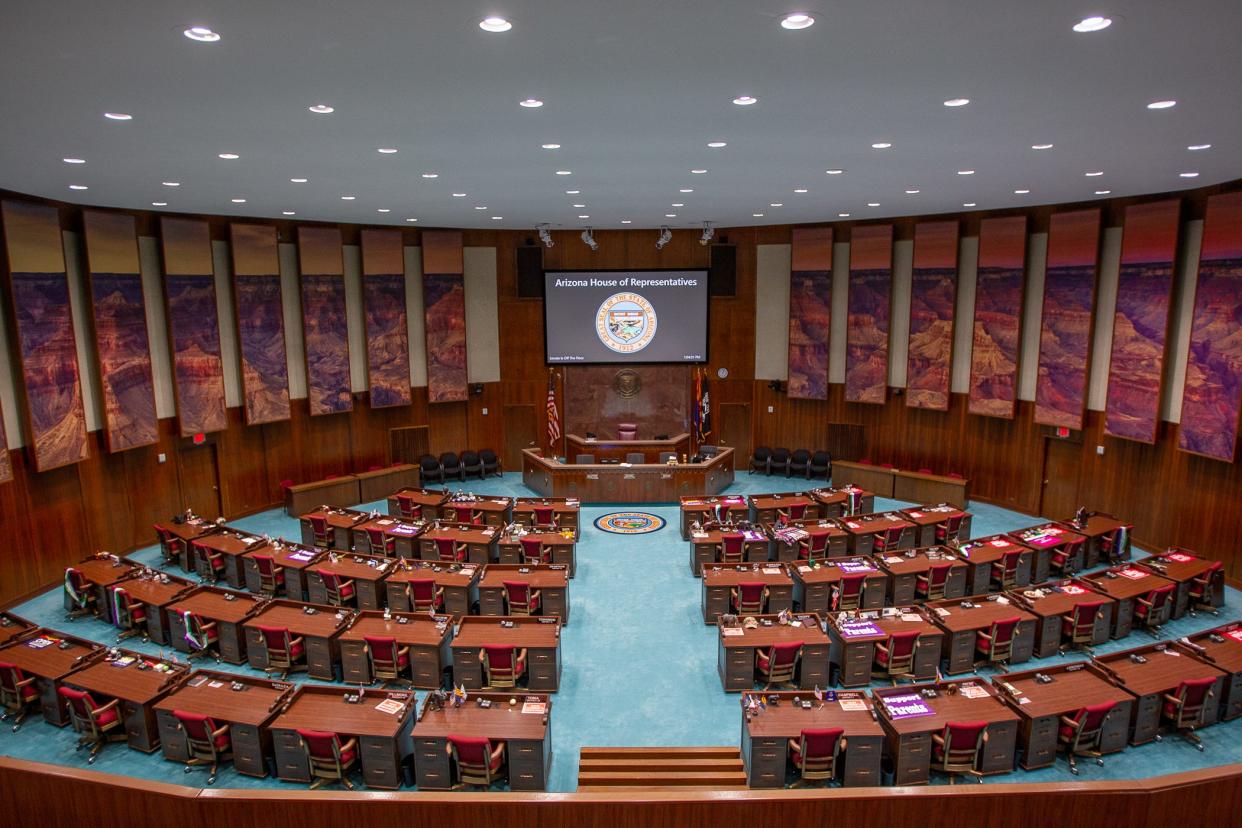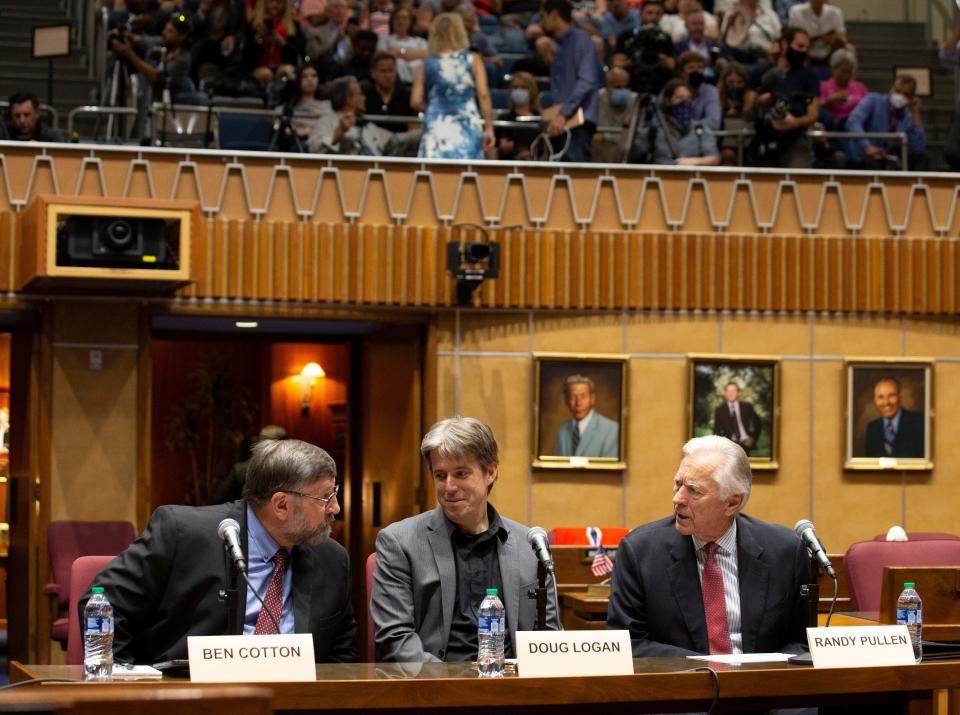Arizona's Republican lawmakers don't want you to know what they're doing

The Arizona Legislature doesn’t want you to know what it’s doing.
At least, the narrow Republican majority in control of today’s Legislature doesn’t think the principles of open government that apply to all public bodies in Arizona should apply to the House and Senate. They’ve taken steps in recent months to block the public’s ability to monitor their activities by exempting themselves from laws that provide meaningful access to the meetings and records of all public bodies in this state.
In Arizona, the twin statutory pillars of open government are the open meetings and public records laws. As the Arizona Supreme Court has repeatedly recognized, “[h]istorically, this state has always favored open government and an informed citizenry.”
Recently, however, the Legislature has expended vast sums of public money to persuade the courts that the open government laws of this state do not apply to itself. The Senate, by stonewalling access to records of its partisan “audit” of the 2020 election in Maricopa County, and the thin Republican majority in both the House and Senate today, have decided that public awareness of their lawmaking activities should be severely curtailed.
Lawmakers met to secretly discuss legislation
Let’s take the open meetings law first.
Over the past few years, the Legislature has been paying lawyers to oppose a lawsuit filed by two nonprofit organizations and several individuals that would have required the Legislature to comply with the open meetings law.
A quorum of five legislative committees had threatened to violate the law by attending a three-day “summit” hosted by the American Legislative Exchange Council (“ALEC”) in Scottsdale, where they could secretly discuss model ALEC legislation.
The Arizona Court of Appeals agreed with the nonprofit groups, ruling that the Legislature had not exempted itself from the open meetings law, and that it must follow the notice, agenda and other legal requirements designed to promote an informed citizenry.
But on Dec. 30, 2022, the Arizona Supreme Court disagreed. It characterized the open meetings law as a “procedural rule” and declined to rule against the Legislature, calling the dispute a “nonjusticiable political question.”
Supreme Court exempted lawmakers from the law
The court found no constitutional violation or infringement of “individual rights,” only the Legislature’s breach of a mere procedural rule. “[A]lthough the legislature should follow its own procedural rules,” the court observed, “we cannot adjudicate any violations [here].”
In short, the Legislature fought tooth and nail with public dollars to ensure that a committee quorum could attend an ALEC summit without complying with the open meetings law – no notice, no agenda, no right of the public to attend and listen to these meetings – and the state Supreme Court agreed.
While reasonable minds could and did disagree over these legal issues, the Supreme Court did not see fit to address the “declaration of public policy” that appears in the open meetings law itself:
“It is the public policy of this state that meetings of public bodies be conducted openly and that notices and agendas be provided for such meetings which contain such information as is reasonably necessary to inform the public of the matters to be discussed or decided. Toward this end, any person or entity charged with the interpretations of this article shall construe this article in favor of open and public meetings.”
In other words, the Supreme Court exempted the Legislature and itself from adherence to this Arizona law.
Then, lawmakers kept 'audit' details secret

Second, the Legislature’s efforts to exempt itself from the open meetings law are nothing compared with the Senate’s attempts to shirk its duties under the public records law.
Take, for example, the Senate’s waste of hundreds of thousands of tax dollars and countless hours on litigation to conceal the details of its “audit” of the 2020 election. In spring 2021, the Senate hired these same lawyers to take positions in public records litigation that the Arizona Court of Appeals repeatedly rejected and that the Supreme Court did not disturb.
Legal fight continues:Cyber Ninjas keeps some 'audit' messages secret
Specifically, the Senate argued that it had no duty to safeguard or disclose public records in the custody of Cyber Ninjas, the Florida corporation to which it paid $150,000 in public funds to conduct the audit, and that it was “immune” to legal challenge under the public records law. It lost on both counts in litigation brought separately by The Arizona Republic and a Washington, D.C.-based nonprofit, American Oversight.
Indeed, the Senate’s resistance to public access left The Republic no choice but to sue Cyber Ninjas and, later, its principals, Doug and Meghan Logan, to secure access to the Senate’s emails and text messages in Cyber Ninjas’ custody.
When, after repeated court orders and sanctions rulings, many of those emails and text messages were finally released by the Logans to the Senate, and then by the Senate to the public, they shone a light on the role played by former President Donald Trump, his supporters and other outside influences in the Senate’s audit.
Now, they want to destroy emails after 90 days
Third, and most recently, both the House and Senate opened this legislative session by passing new rules that require the destruction of their members’ emails and text messages within 90 days of their creation. In the wake of the Senate’s losing battles to conceal audit records, the Legislature’s new rules were surely petty and vindictive, and contrary to the public interest in open and transparent government.
In recent years, the Legislature has shown a penchant for introducing “strike everything” amendments to bills that involve new and different subjects at the eleventh hour of the session, often without any meaningful public hearing or discussion. With all emails and text messages of legislators destroyed in 90 days, there may be no practical way for us to know what our legislators have been up to – or who put them up to it.
To be sure, the public retains the right every two years to vote their legislators out of office, and perhaps the next lot will abolish these new rules and recognize the importance of preserving public records that accurately reflect the public business conducted by their members.
But today’s issues cannot wait until 2025 for an informed citizenry. We cannot afford more secrecy in government, where private interests determine where public dollars go, and when issues ranging from education and the environment to public health and safety demand wise and immediate attention.
Open government is good government
Some may say our Constitution itself was born in secrecy, but that’s no excuse for passing laws in the dark. If the Bill of Rights, the Civil War and 26 amendments teach us anything, they surely show that the constitution of 1787 was a beautiful but imperfect document that a little sunlight in Philadelphia might well have improved.
Perhaps this recent penchant for official secrecy is the culmination of government by one political party in all three branches of Arizona government.
Maybe the election of a Democratic governor and the Republican Party’s narrow control of the Legislature will prompt our elected officials to meet the pressing challenges of our times and get on with the public’s business – assuring ample water, clean air, affordable housing, equal justice and all of the other things that restore harmony to community.
Such progress does not come from distrust and concealment of public deeds. Rather, democracy blooms in the open, where public officials are not afraid to show their work and let the public participate as fully as reasonably possible.
That’s the essence of good government. Now it’s time for the Legislature to show up – and open up.
David J. Bodney is senior counsel at Ballard Spahr LLP and serves as counsel to Phoenix Newspapers, Inc. and The Arizona Republic.
This article originally appeared on Arizona Republic: House, Senate Republicans don't want you to know what they're doing

